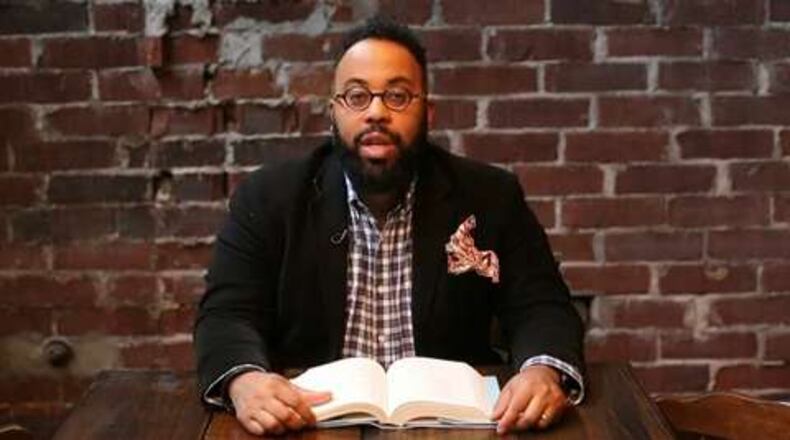Reading Kevin Young’s poems feels like glancing over his shoulder as he revisits the scenes of fond memories, savors a fine meal, grooves to ‘80s music and confronts his own grief. A former Emory University professor who now serves as The New Yorker’s poetry editor, Young has a way of transforming these things, even grief, into something beautiful.
Young, the son of an ophthalmologist and a chemist from Louisiana, has made a living by collecting and preserving memories and other precious things. At Emory, he served as the curator of Literary Collections and the Raymond Danowski Poetry Library. He left Emory to direct the Schomburg Center for Research in Black Culture, a library that seeks to preserve African American experiences. Now he leads the Smithsonian’s National Museum of African American History and Culture.
In “Stones,” his newest collection of poetry, Young mines his own roots. The 44 poems within serve as an homage to his loved ones and their home places. In “Tonsure,” Young describes seeing his father, who died in a hunting accident, in other men’s faces — or balding heads and beards — and then following these strangers “for blocks after / to make sure / you’re wrong.” He pivots to becoming a father himself, a “father / you make / each day, the one / you became when yours / got yanked away.”
Young, who is influenced by Langston Hughes’ tragicomic writing, weaves in bits of humor between the grief. He buys one of these strangers a beer to share — “Well, not / just one.”
The poet draws a connection between generations of his family while visiting his father’s grave in “Lilies.” Addressing his dad, he writes: “never will you know / how words blossom / from my son / this Memorial Day, visiting / your stone —”
His son keeps popping up in Young’s newest collection. In “Body Shop,” for example, he is “picking up small stones / as if he knows / where we’re going.” In “Spruce,” Young writes: “Whenever I am outside, / says my toddler, I’m always / a goner.” His words / a stone on my tongue.” And in “Squall,” he observes his son reacting to a powerful storm: “My young son’s excited / by every boom — / says Wow & claps along / as we watch the monsoon / from Mama Annie’s / tiny, tidy rooms.”
The rhymes in these lines highlight how music — blues, jazz, reggae, hip hop, country, rock and punk — informs much of his work. In a 2016 interview for my review of his collection “Blue Laws,” Young told me he listens to music when he writes, pulling from an iTunes collection of about 35,000 songs. He pointed out that his paternal grandfather performed in a zydeco band.
“It is another way of talking about pain and love,” Young told me then. “Great music — say jazz — has that inventive, improvisational quality that tells us something about life. I think it is Ralph Ellison who said life is jazz-shaped. And that kind of idea — that jazz really mirrors the way we live — is important to me.”
Young studied under poets Seamus Heaney and Lucie Brock-Broido and joined the Dark Room Collective, a group of Black writers that included fellow poet Natasha Trethewey, also a former Emory professor. The author of 15 books of poetry and prose, Young has received a Guggenheim Fellowship, won the PEN Open Book Award and has been a finalist for the National Book Award.
He has written about a broad variety of subjects. Among them: the musician Prince, hoaxes, the Amistad slave rebellion and the late artist Jean-Michel Basquiat. In “Stones,” he focuses on memory, loss and resurrection, themes central to the poem “Oblivion.” In that piece, he writes about life’s unending cycles.
“Cows know the slow / closing eye of the pond / will once more open / & the sky — rain will find / their bowed backs, / the burnt earth’s offering.”
In “Egrets,” cows appear again, “sensing slaughter” while keeping company with hungry horses that “eat / from your palm.” He writes: “tender-toothed — / their surprising / plum-dark tongues / flashing quick / & rough as a match — / striking your hand, / your arm, startled / into flame.”
Young is at his best in “Stones” when he presents his readers with such striking images, memories he is seeking to pin down, fix in time and collect. We are lucky he allows us to travel with him into his past and glance over his shoulder.
POETRY
“Stones”
by Kevin Young
Penguin Random House
128 pages, $27
About the Author
Keep Reading
The Latest
Featured





